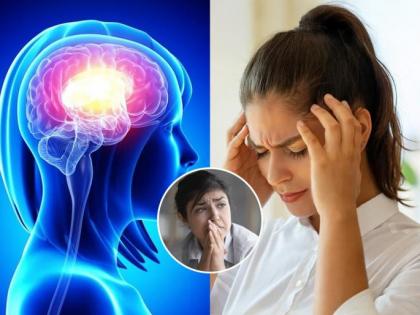What Is Brain Fog and Why It Affects Women; Know It Causes, Symptoms, and How to Overcome It
By Lokmat Times Desk | Updated: September 23, 2025 14:28 IST2025-09-23T14:28:33+5:302025-09-23T14:28:47+5:30
After crossing the age of forty, many changes start happening in women's bodies. Among all these changes, women mainly ...

What Is Brain Fog and Why It Affects Women; Know It Causes, Symptoms, and How to Overcome It
After crossing the age of forty, many changes start happening in women's bodies. Among all these changes, women mainly experience some changes related to the brain. One of these problems is brain fog. In this, women often suffer from forgetting small things, not being able to concentrate on work, and feeling constantly tired. Although it is not a serious disease, it can have a big impact on your daily life. Hormonal changes, increased stress, lack of sleep, and some lifestyle habits are largely responsible for this.
Brain fog is easily managed with proper care and lifestyle adjustments. While not a disease, neglecting it can impact cognitive function. Simple solutions and good habits can restore mental clarity and keep your brain active. Let's explore the nature of brain fog and effective strategies for reducing its effects.
What is brain fog: Brain fog is a condition in which the brain becomes very confused and sluggish. In this, a person has difficulty remembering things, concentrating and feels like the brain is tired. According to Dr. Parth Nagda, a psychiatrist at Kokilaben Dhirubhai Ambani Hospital, Navi Mumbai, irregular sleep schedule, staying up late at night, stress, excessive screen time, excessive use of social media and eating too many sweets can increase the symptoms of brain fog.
Why does brain fog increase only after forty?
After forty, the levels of hormones like estrogen, progesterone and testosterone start changing. These hormones play an important role in brain function. Their low levels affect memory and concentration. Apart from this, daily stress, multitasking, lack of water and lack of physical activity can also increase the problem of brain fog.
Symptoms of brain fog...
- Forgetting why you came there after entering a room.
- Frequent distractions while doing daily tasks.
- Irritability, restlessness and feeling heavy in the head.
Easy solutions to reduce the problem of brain fog...
- Get enough sleep: - Make it a habit to sleep for 7 to 8 hours every day and fix a time to go to bed and wake up.
- Eat a healthy diet: - Include plenty of fruits, green vegetables, grains and omega-3 fatty acids in your diet. Avoid eating sweets, alcohol and junk food completely.
- Keep the body hydrated: - Drink enough water throughout the day, because lack of water in the body reduces brain performance.
- Be physically active: - Walk or exercise for at least 30 minutes every day, which will increase blood flow to the brain and improve thinking ability.
- Reduce screen time: Take short breaks during study or work and stay away from digital devices for a while.
- Manage stress: Take time to relax yourself through meditation, mindfulness, or your favorite hobby.
Also Read: Why Anger Can Be Dangerous for Your Heart? Know How Anger and Stress Can Trigger Cardiac Issues
When to see a doctor?
If these symptoms persist for a long time or are increasing, it is necessary to consult a doctor. Sometimes brain fog can also be caused by thyroid, vitamin deficiencies, or other health problems.
Open in app